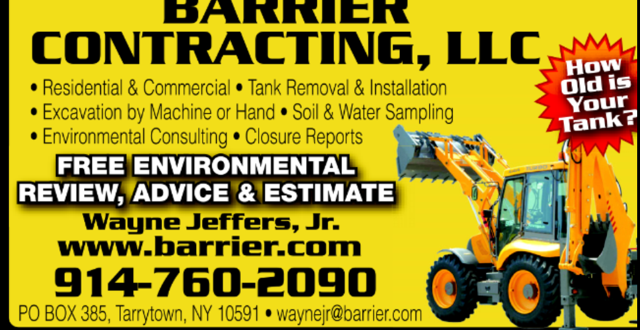Excavating, Sampling and Disposing of Oil or Gasoline Contaminated Soil
Barrier provides Excavating, Sampling and Disposing of Oil or Gasoline Contaminated Soil. There are many regulations in New York State (NYS) regarding the removal and disposal of soil that has been contaminated by oil or gasoline. The regulating agency is the New York State Department of Environmental Conservation (NYSDEC). Information regarding these regulations can be found on their website http://www.dec.ny.gov/.
If Heating Oil, Diesel Fuel, Kerosene or Gasoline, leaks or spills in the soil, the impacted areas should be excavated and the soil safely disposed of. If you encounter this you should notify the NYSDEC spill hotline (800) 457-7362 and contact an environmental company, Barrier Contracting, LLC, for advice. The proper disposal includes collecting soil samples of the impacted soil to be analyzed by a certified lab. The samples can be collected after the soil is excavated and stockpiled or prior to excavation. The results are then sent to the licensed disposal facility for review. Once approved, the contaminated soil can be loaded and shipped to the disposal facility by a specialized hauler.
After the contaminated soil has been removed, a consultant or specialized contractor, like Barrier, collects endpoint samples from the four walls and the base. Again, these samples are sent to a certified lab to be certified. When sampling, the sampler must also fill out a chain of custody for the sample, these are usually signed by the sampler, transporter and laboratory technician. These “endpoint” or “post excavation” samples will be used to determine if all of the contamination has been removed. Once, confirmed that the soil is now free of contamination, backfill can be brought in to replace the contaminated soil that has been removed.
While this seems like a simple process, it is extremely important to hire the right professional to guide you through the process. There are many companies to choose from in Westchester and Putnam County. Be sure to ask for references or read reviews (Angie’s list is also a great tool). Choosing the wrong contractor can add to the time and cost of the clean-up. The professional must be aware of the regulations and protocols involved with cleaning up oil contamination. All of the information, analytics, manifests, weight tickets, etc, must be included in a concise report describing the work that transpired and proving the contamination has been properly removed and disposed of.

